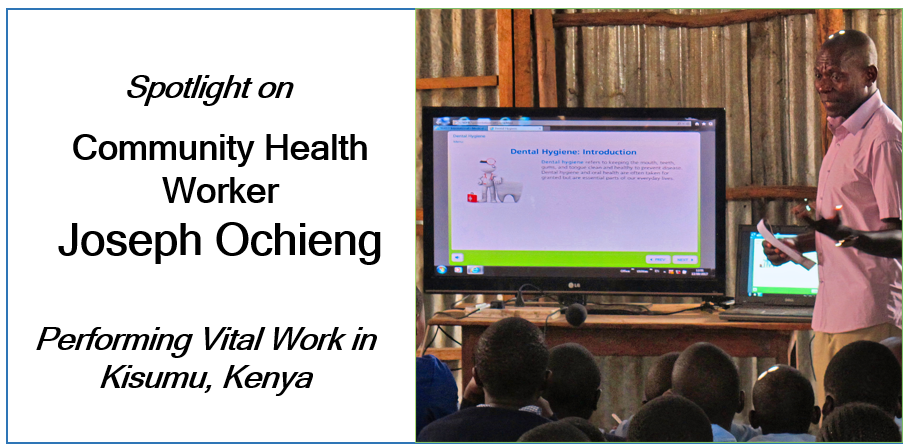By Allison Kozicharow; Edited by Elizabeth Fine
The following is an April report that veteran CHW Joseph Ochieng recently sent to WiRED, which illustrates the value of the CHW teams and highlights a remarkable man’s dedication to the health of his community.
My Testimony on the Health Screening Clinics
By Joseph Ochieng, CHW and veteran WiRED staffer
Background
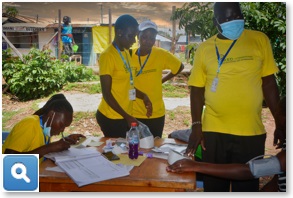 Obunga is one of the three major informal settlements in Kisumu, Kenya and ranks highest in lack of proper infrastructure, access to clean water and social and health amenities.
Obunga is one of the three major informal settlements in Kisumu, Kenya and ranks highest in lack of proper infrastructure, access to clean water and social and health amenities.
Obunga has a population of 5,000 people living in about 1,000 to 1,500 households. Obunga is divided into five units, all of which are served with only a poorly equipped local county dispensary managed by the county government of Kisumu.
With health as a major priority of the residents, WiRED CHWs based in the area always insist that health outreach be done at least every month, but this is not always possible since other areas must also be covered.
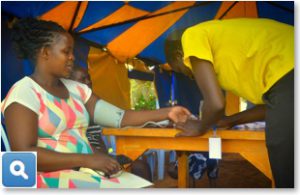 Because of the above, outreaches in Obunga are always packed such that CHWs have extra work in controlling the crowd of patients who always scramble for the services.
Because of the above, outreaches in Obunga are always packed such that CHWs have extra work in controlling the crowd of patients who always scramble for the services.
Outreaches (Health Screening Clinics)
As always, the CHWs made sure that the tent with 100 chairs is in place immediately after sunrise since the clients start trooping in as early as 8:00 a.m. Our team’s clinical officer arrived at 9:00 a.m. to find the tent already full, but the crowd was well managed by the CHWs, clad in their yellow and green T-shirts with their name tags on as instructed by program manager Lillian Dajoh.
The services offered included the treatment of ailments such as malaria, TB screening with a special x-ray machine (USAID sponsored), blood pressure checkups, blood sugar checkups and HIV testing services — and of course health education by the CHWs under the slogan “Community Health Starts with Knowledge.” All the services are absolutely free.
A Bridge to Higher-Level Care
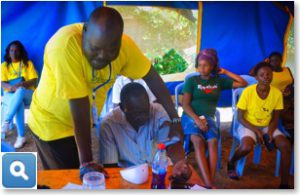 A young boy was escorted into the camp by CHW Zachary Omondi, who discovered him lying helpless in a house where he lives with his elderly grandma. The old woman always depended on well-wishers to help both her and her grandson, whose mother had passed on.
A young boy was escorted into the camp by CHW Zachary Omondi, who discovered him lying helpless in a house where he lives with his elderly grandma. The old woman always depended on well-wishers to help both her and her grandson, whose mother had passed on.
The boy was found to have a serious skin and ear infection. With the help of the CHWs, the boy was taken through the system (to a health clinic) so that proper examination and management were done. Now he is back home with the right drugs. Gratitude to WiRED for giving him a helping hand.
April Community Health Worker Report
During the month of April 2024, when rains and flooding affected Kisumu, 20 CHWs reached a total of 9,330 people with health services. Working 24 hours per week, each of the CHWs met with at least 75 patients a week, and the largest number seen in a week by a single CHW was 185, most of them in health training classes.
In April the top health-related concerns were, as follows, in order of prevalence:
- Malaria
- Water treatment
- Cholera
- Hygiene
- Handwashing
Joseph Ochieng
By Gary Selnow, Ph.D, WiRED Executive Director
I met Joseph Ochieng more than two decades ago when I first visited Kisumu for a health education project sponsored by the U.S. National Institutes of Health. We were setting up community health training facilities, and I was considering Kisumu as one of the 23 locations we would set up across Kenya.
Joseph showed up with a small group of young Kenyans at KUAP Pandipieri, a charitable facility, operated by Sister Bernadette Nealon. Pandipieri hosted a clinic, a school and several food programs for underserved populations. I was looking to hire a small staff that would run the open-access health education facilities called Community Health Information Centers (CHICs). Joseph was intensely interested in the project, and he was among the first group of around 12 young people we hired to staff the CHICs.
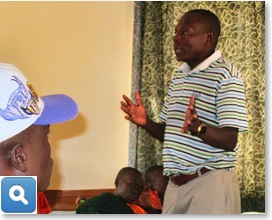 Joseph stayed with the CHIC program over the years, and in 2019, when we shifted our focus from the CHICs to our current Community Health Worker (CHW) program, he, along with several other staffers, enrolled in the second training class. With his new CHW certificate, Joseph joined our team of 21 CHWs, headed by Lillian Dajoh, WiRED’s CHW manager.
Joseph stayed with the CHIC program over the years, and in 2019, when we shifted our focus from the CHICs to our current Community Health Worker (CHW) program, he, along with several other staffers, enrolled in the second training class. With his new CHW certificate, Joseph joined our team of 21 CHWs, headed by Lillian Dajoh, WiRED’s CHW manager.
Teaching health is a key CHW responsibility, and Joseph has consistently been one of the most effective teachers, especially teaching young people. He has a comprehensive knowledge of the material, and he uses that knowledge to engage the audience in active discussions. I’ve seen him interact with 75 middle-school children about dental hygiene. He’ll ask a question, then suggest the wrong answer, and that invokes shouts from the class, eager to correct him! If energy levels dip, he reinvigorates the group with hand-clapping rhythms before delving back into the topic at hand, whether dental care or some other health topic. No one falls asleep in Joseph’s class!
Now approaching middle-age, Joseph is a well-respected community leader who advocates for community health — and home gardens. He grows his family’s food and shares seedlings with anyone interested in cultivating their own vegetables, which can significantly improve family diets in an environment where food shortages are common.
I have admired Joseph for many years and have come to know him through our work together. I’m encouraged by the examples he provides of how the CHW program, operating from KUAP Pandipieri, positively impacts health in Kisumu’s challenging environment.

